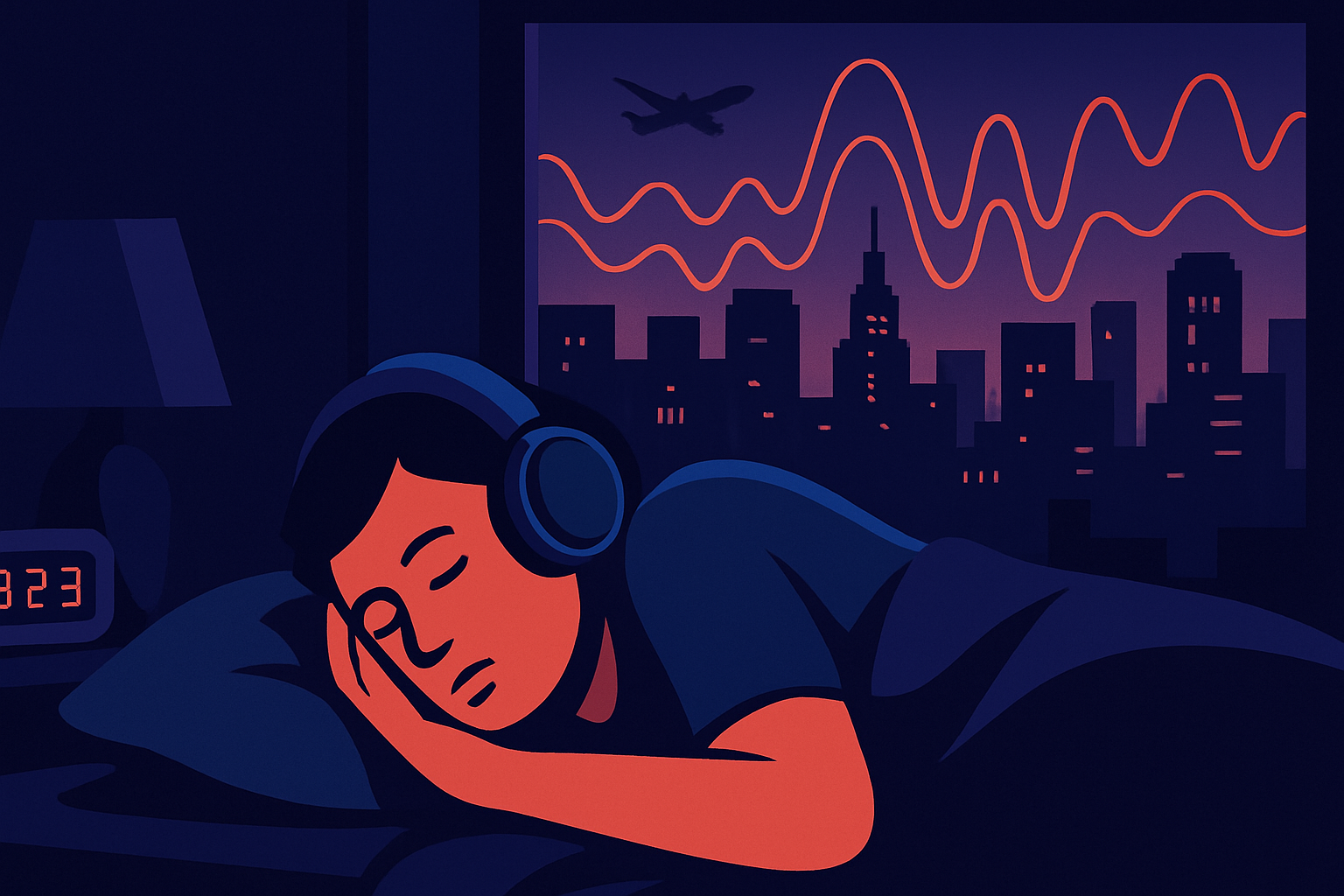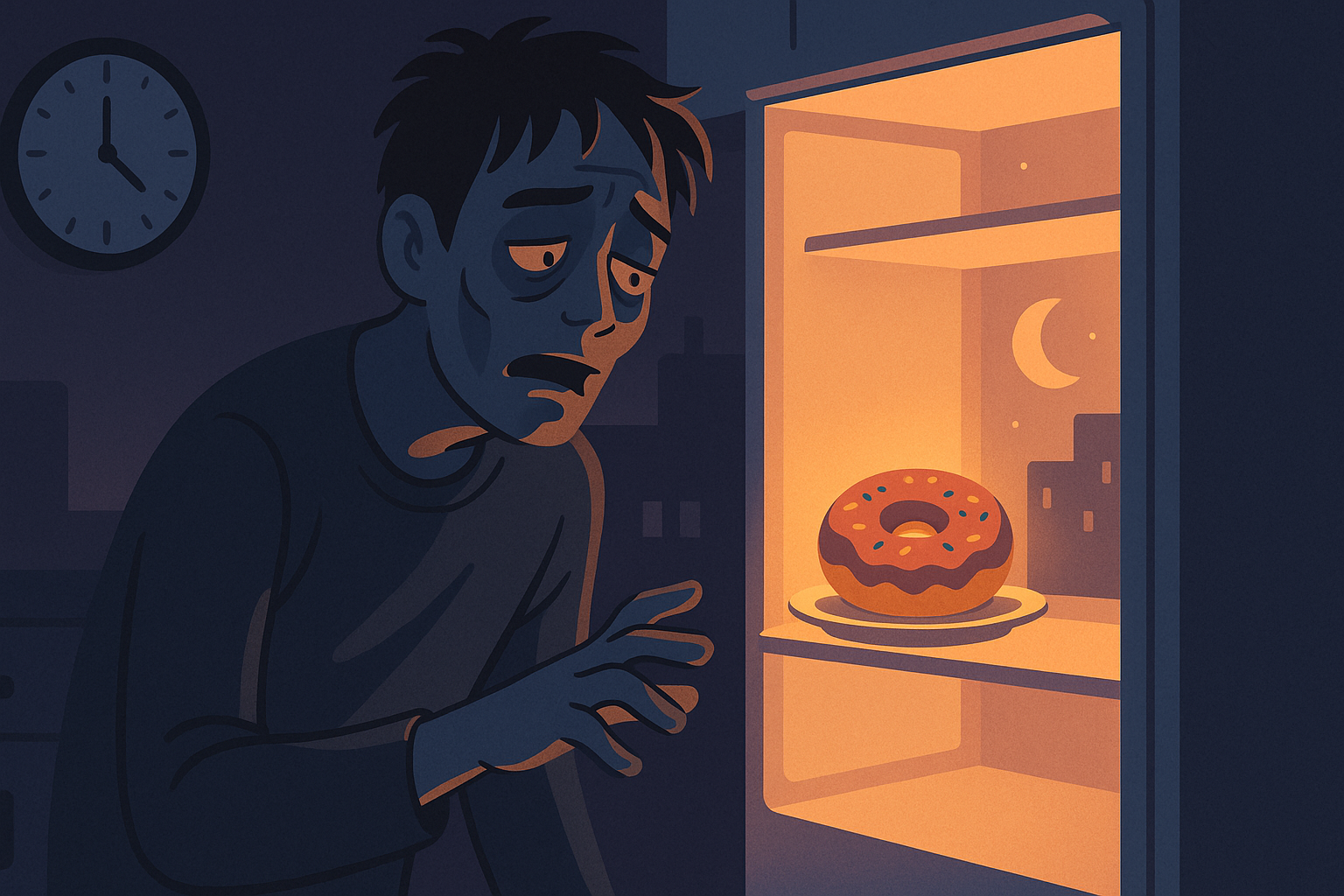The Hidden Pollutant in the Airwaves
When we hear the word pollution, we picture smoggy skies or oily rivers. Yet the World Health Organization ranks environmental noise as the second-largest threat to public health, right after air pollution. From roaring engines and screeching trains to weekend street parties, city noise routinely hovers 10–20 dB higher than levels considered safe for sleep (≤ 40 dB).
Many urban blocks never dip below 55 dB, even after midnight. That difference may look small, but every 10-dB uptick roughly doubles the intensity of a sound. Your body notices, whether or not you consciously “get used to it.”
How Urban Noise Disrupts Your Sleep Cycle
A healthy night’s rest flows through light, deep, and REM stages. Sudden or continuous sounds can:
- Trigger micro-awakenings you don’t remember.
- Shrink deep slow-wave and REM sleep, the phases that restore memory, mood, and immune function.
- Spike cortisol and adrenaline, elevating heart rate and blood pressure while you appear “asleep.”
Lab studies show that traffic noise alone fragments sleep architecture and reduces REM time. Even if you swear you sleep through sirens, your nervous system still reacts.
Fighting Noise with Noise: The 2021 New York City White Noise Study
One of the most intriguing findings in recent years is that adding sound — specifically broadband white noise — can improve sleep in noisy environments.
A 2021 pilot study of ten adults in New York City, all struggling with sleep because of high ambient noise, tested a simple intervention: a small white noise machine placed in the bedroom for one week. Compared with their baseline week, participants:
- Fell asleep faster — average sleep latency dropped significantly.
- Spent less time awake after sleep onset (WASO).
- Reported fewer nighttime awakenings and a trend toward better sleep efficiency.
Key takeaway: Consistent white noise can mask unpredictable honks and sirens, smoothing the soundscape so your brain stays in deeper stages of sleep.
Source: Ebben et al., 2021
Beyond Grogginess: The Long Term Health Toll
1. Cardiovascular Stress
Repeated nighttime adrenaline surges wear down blood vessels. Long term European cohort studies reveal that every 10 dB rise in chronic traffic noise bumps heart-attack risk by about 5 %. U.S. data echo the trend: neighborhoods under flight paths see higher hypertension and stroke rates, even after adjusting for air pollution.
2. Metabolic & Mental Health
Fragmented sleep disrupts glucose metabolism and appetite-regulating hormones, encouraging weight gain and insulin resistance. Noise annoyance is also tied to increased odds of anxiety and depression. Chronic exposure keeps the body “on alert,” draining emotional resilience.
3. Cognitive Development
Children are especially sensitive. Classroom studies show that exterior noise above 50 dB impairs reading scores and memory. Nighttime disturbances lengthen kids’ sleep onset, leading to daytime fatigue and learning difficulties.
4. Who’s Most Vulnerable?
- Shift workers fighting to sleep during noisy daylight hours.
- Older adults, whose lighter sleep makes them easier to wake.
- Low-income communities clustered near highways or rail lines — an environmental justice issue.
- People with existing health conditions (e.g., hypertension) that noise can aggravate.
Five Ways to Reclaim Your Rest
Good news: you don’t have to move to the countryside to protect your sleep.
- Mask unpredictable sounds with steady, soothing audio. The New York white noise study above shows real benefits. A relaxation app like Moon: Sleep and Relaxation lets you play ocean waves, rainfall, or gentle hums that blanket honks and sirens.
- Upgrade your bedroom barriers.
- Install heavy blackout curtains or window inserts.
- Add rugs, bookcases, or acoustic panels to absorb echo.
- Seal gaps around windows and doors with inexpensive weather-stripping.
- Use earplugs or noise-canceling headphones. Modern silicone plugs can block 15–30 dB while remaining comfortable for side sleepers.
- Adopt a pre-sleep ritual. Gentle stretching, box breathing, or a guided meditation lowers baseline stress, making surprise noises less jolting.
- Advocate for community quiet. Support lower speed limits, late night construction bans, or noise cameras that ticket illegal mufflers. Cities from Paris to New York have begun enforcing quiet hours with measurable drops in ambient decibels.
Embracing Calm in a Noisy World
City living offers vibrant culture, cuisine, and convenience, but peace and quiet isn’t usually part of the package. The evidence is clear: unchecked urban noise pollution chips away at sleep quality, elevates cardiovascular risk, and strains mental health.
Tonight, dim the lights, cue up your favorite relaxation sound in Moon, and shut out the chaos. In the city that never sleeps, you can carve out your own pocket of calm — and your heart, mind, and mood will thank you in the morning.
→ Download Moon: Sleep and Relaxation on the App Store to help reduce the impacts of background sound in your areas. By counterbalancing the outside noise with brown noise, for instance, you can get a better night’s sleep.
Further Reading
- World Health Organization. Environmental Noise Guidelines for the European Region.
- Harvard T.H. Chan School of Public Health. “Noise Can Harm Your Health, Even If You Sleep Through It.”
- Ebben, M. R., Yan, P., & Krieger, A. C. (2021). The effects of white noise on sleep and duration in individuals living in a high noise environment in New York City. Sleep Medicine, 83, 256-259.
- European Environment Agency. Noise in Europe 2020 Report.
- Sørensen, M. et al. “Road Traffic Noise and Hypertension: A Meta Analysis.” Environmental Health Perspectives (2021).


